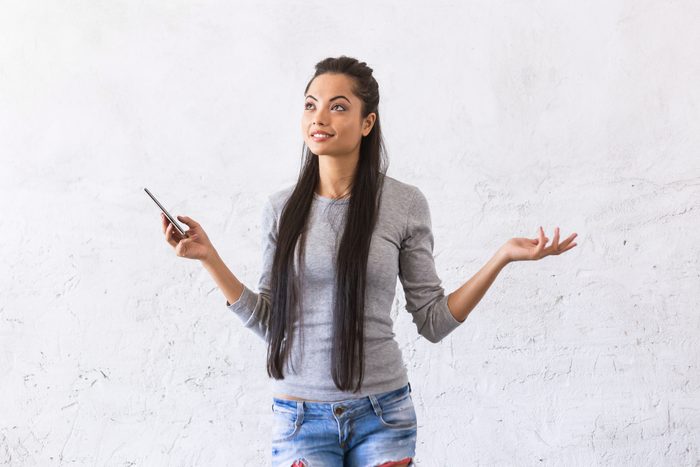The #1 Best Way Respond When Someone Unfriends You, According to an Expert on Psychology & Social Media
Updated: May 30, 2023

Plus, this expert reveals how to determine that it's healthy to unfriend or unfollow someone for your own mental health.
When it comes to our relationship with social media, the only simple way to sum it up is to say that it’s complicated. The 2023 digital media trends report from the market research firm Deloitte found strong samples of young adults who reported finding community and connection through their online presence, with almost 50% of participants engaging more with others through social media than in-person.
So when something rocks the boat between you and an online connection, it can hit in a unique way. To start, says Jonathon Alpert, LPC, a psychotherapist who specializes in social media use and the author of Be Fearless: Change Your Life in 28 Days—when we put so much of ourselves into our social media image, we can get hypersensitive to even the slightest negative experiences or forms of rejection. Research has found that unfriending on social media has psychological and emotional impacts similar to being socially excluded in real life.
Social media also involves different (and constantly shifting) etiquette, norms, and ways of communicating, so it’s normal to feel confused about how to navigate a breakdown in these online connections. If you’re feeling the sting of a social media relationship lost, Alpert shares tips to heal and move forward.
13 Things That Could Happen When You Quit Social Media
Here’s how to react when someone unfriends or unfollows you
Don’t jump to conclusions
“Remember that social media connections are not always reflective of the real-life relationship,” Alpert says. The nature of social media is that it allows people to curate their own personal world, whether that’s their tool for debate and expression or just a place to scroll for cooking inspiration.
“Don’t erroneously conclude that [unfriending] is a personal attack on you,” Alpert says. A coworker may enjoy your working relationship, for example, but your interests and hobbies don’t align in the social world, or they want some separation between work and play—and that’s OK. Similarly, you can’t always know what someone else is going through, and they may be setting new boundaries in their social media use to work on their mental health.
Don’t ruminate
“It’s natural to feel a sense of loss or rejection when someone unfriends you, but dwelling on it excessively can be detrimental to your mental health,” Alpert says. Try to avoid overthinking their intentions or constantly checking their profiles for updates, he advises.
How Rumination and Obsessive Thoughts Are Linked to Anxiety and Depression
Have a conversation
If you feel comfortable doing so, consider having an open and honest conversation about why someone unfriended you, Alpert advises. The way people interact with their own online world changes all the time, and curating their friends list may have nothing to do with you as a person but entirely based on how they want to shape their social media experience—and respecting their decision may be the most harmonious choice you can make (perhaps most of all for yourself).
Still, if you were intentionally unfriended, this conversation can help you explore potential unaddressed issues in your real-life relationship.
Friendship Breakup: Here’s How (and When) To Move On From a Friend
Validate offline relationships
It’s important to take stock of how social media affects your mood and self-esteem. If you notice you feel especially snubbed by a social unfriending, this could be a sign to check in with your in-person network. “Meaningful face-to-face interactions provide a sense of belonging and support that social media often lacks,” Alpert explains. Just as others’ online behaviors and activities aren’t representative of real life, “your value as a person extends beyond social media connections.” Let your pals who know you well boost your spirits and reinforce your goodness.
Examine your own relationship with social media
Recent research shows that social media can have a positive influence on some people’s lives. A study from Pew Research Center found that a majority of teens say social media strengthens their friendships, allows them to show and cultivate creativity, and can be a place to find reassurance and acceptance in tough times.
But how people use social media is very personal. Alpert suggests if someone else’s behaviors have a big effect on how you feel about yourself, it’s worth considering how much of your self-worth is wrapped up in your digital presence. “Be mindful of your emotional reactions while using social media,” he says. “Developing self-awareness can help you identify triggers and take appropriate action,” like setting boundaries around your own social use, changing what content you’re exposed to, or learning to approach social media with a more critical mindset.
16 Quotes About Boundaries That Will Help You Say “No”
Here’s when it’s OK to unfriend someone
On the flip side, being selective with your own social media network can help you create a digital world that’s positive, Alpert explains. “Just as it is important to set boundaries with people in real life, it’s important to set boundaries and prioritize one’s well-being when it comes to social media interactions,” he says. Unfriending someone on social media can be a reasonable action if maintaining that connection is causing negativity or making you feel bad about yourself, for instance.
But, this therapist says, it’s important to consider your motivation for unfriending someone. “Ask yourself: Is it based on a temporary disagreement or a fundamental difference in values and beliefs?” In cases where the relationship has become toxic or unhealthy, you might distance yourself from those negative people. Still, it’s important to make sure your decision to unfriend isn’t an impulsive or vengeful one. “It’s always best to first attempt to have open communication and attempt to resolve conflicts or misunderstandings before severing the online connection.”
Stay well with The Healthy @Reader’s Digest newsletter. Keep reading:



















